

Webinar: Cool Tools for You and Your Library. Infographic Amy Johnson. Professional Learning Network. Career Center. Twitter Assignment. The Beginner's Guide to Twitter. Update: This post was updated November 2013 to reflect current statistics and tools.
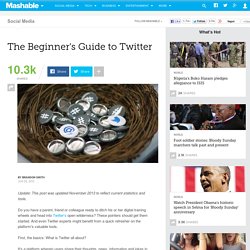
Do you have a parent, friend or colleague ready to ditch his or her digital training wheels and head into Twitter's open wilderness? These pointers should get them started. And even Twitter experts might benefit from a quick refresher on the platform's valuable tools. First, the basics: What is Twitter all about? It's a platform wherein users share their thoughts, news, information and jokes in 140 characters of text or less. On Twitter, following someone is not necessarily an admission of friendship, but nonetheless affords interaction and conversation — at least in short bursts. The first step is to understand and master the vernacular. Tweet: A 140-character message.Retweet (RT): Re-sharing or giving credit to someone else's tweet.Feed: The stream of tweets you see on your homepage. Twitter has a great online glossary that you can refer back to, should you get mired in a vocab morass. 1. 2. 3. 4. 21st Century Skills Article. Thoughtful Learning: Curriculum for 21st Century Skills, Inquiry, Project-Based Learning, and Problem-Based Learning.
Literacy skills help students gain knowledge through reading as well as using media and technology.
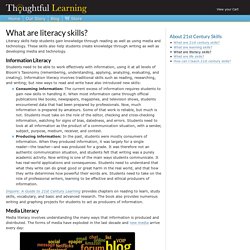
These skills also help students create knowledge through writing as well as developing media and technology. Information Literacy Students need to be able to work effectively with information, using it at all levels of Bloom's Taxonomy (remembering, understanding, applying, analyzing, evaluating, and creating). Information literacy involves traditional skills such as reading, researching, and writing; but new ways to read and write have also introduced new skills: Consuming information: The current excess of information requires students to gain new skills in handling it.
Thoughtful Learning: Curriculum for 21st Century Skills, Inquiry, Project-Based Learning, and Problem-Based Learning. The 21st century skills are a set of abilities that students need to develop in order to succeed in the information age.
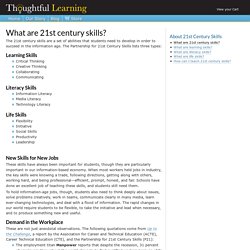
The Partnership for 21st Century Skills lists three types: Learning Skills Critical Thinking Creative Thinking Collaborating Communicating Literacy Skills Information Literacy Media Literacy Technology Literacy Life Skills Flexibility Initiative Social Skills Productivity Leadership New Skills for New Jobs These skills have always been important for students, though they are particularly important in our information-based economy. To hold information-age jobs, though, students also need to think deeply about issues, solve problems creatively, work in teams, communicate clearly in many media, learn ever-changing technologies, and deal with a flood of information. Demand in the Workplace These are not just anecdotal observations.
Nine Elements. Nine Themes of Digital Citizenship Digital citizenship can be defined as the norms of appropriate, responsible behavior with regard to technology use.
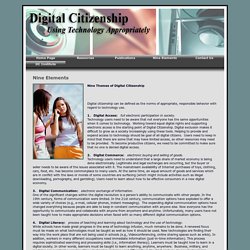
TLDE UNO. Welcome to Teaching and Learning in the Digital Environment Spring - 2015 Welcome to your one-stop shop for sites discussed during class.
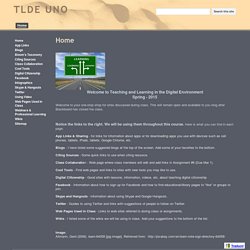
This will remain open and available to you long after Blackboard has closed the class. Notice the links to the right. We will be using them throughout this course. Here is what you can find in each page: App Links & Sharing - for links for information about apps or for downloading apps you use with devices such as cell phones, tablets, iPads, tablets, Google Chrome, etc. Blogs - I have listed some suggested blogs at the top of the screen. Citing Sources - Some quick links to use when citing resource. Class Collaboration - Web page where class members will edit and add links in Assignment #6 (Due Mar 1). Cool Tools - Find web pages and links to sites with new tools you may like to use. Digital Citizenship - Good sites with lessons, information, videos, etc. about teaching digital citizenship Wikis - I listed some of the wikis we will be using in class.
From Wax Cylinders To Records, Saving The Sounds Of History. Actor, playwright and composer Noel Coward rehearses for a show in 1951.
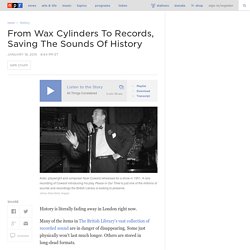
A rare recording of Coward introducing his play Peace in Our Time is just one of the millions of sounds and recordings the British Library is looking to preserve. Jimmy Sime/Getty Images hide caption itoggle caption Jimmy Sime/Getty Images Actor, playwright and composer Noel Coward rehearses for a show in 1951. A rare recording of Coward introducing his play Peace in Our Time is just one of the millions of sounds and recordings the British Library is looking to preserve. Jimmy Sime/Getty Images History is literally fading away in London right now.